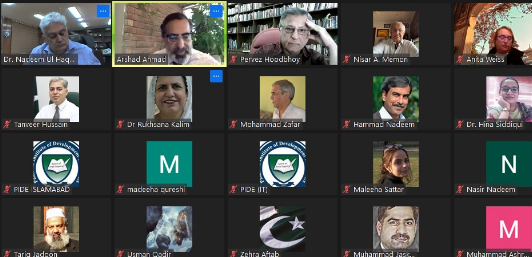Islamabad (PR): Pakistan Institute of Development Economics (PIDE) on Monday hosted a webinar titled ‘HEC Travails part-1’.
The webinar was attended by Professor. Pervaiz Hoodbhoy, Nuclear Physicist and activist with Dr. Arshad Ahmad, Vice-Chancellor Lahore University of Management Sciences along Dr. Anita M. Weiss Professor Department of Global/ International studies, University of Oregon and Professor Iqrar Ahmad khan, Ex-Vice Chancellor University of Agriculture, Faisalabad. The session was moderated by Dr. Nadeem ul Haque, Vice-Chancellor, PIDE.
Professor Pervaiz criticized the role of HEC. He expressed that HEC is at the bottom list in regional countries and HEC Reward program that started in 2002 is now the most politicized and corrupt program in the country. Pervaiz further mentions that in 2001 Pakistan got 1200% higher amount of budget from USA, which contrary to common belief, guided Pakistan in the wrong direction and pushed us at the edge of disaster. Professor Pervaiz further suggested that the reward should be given to the competence and not just the research.
Dr. Arshad Ahmed, questioned the existence of HEC and its core values. He also mentioned that Pakistan should not make HEC the boogeyman. Dr. Arshad also mentioned that the incompetence of the organization can be solved with three factors. Firstly, the allocation of funds needs to be in the hands of the organization and not the government as it changes quite frequently in Pakistan.
Second factor that can enhance HEC’s performance is autonomy, it must stand on its own feet and consists of a standard working formula. Third and the last factor is quality, If the institute ensures rule and regulations and cross checks for issues such as fraudulentdegrees. It can overcome this pit; it is no rocket science.
Dr. Anita M. Weiss expressed that merit is a great issue when it comes to HEC, as a former student in Pakistan she mentions a couple of incidents where she felt that there is lack in the merit system. She also mentioned that the work or research done by students especially PhD, is not worth the while. HEC has embroiled in politics as an institution due to which quality of basic and secondary education is weak, which as a result affects the higher education of Pakistan too.
Dr. Iqrar Ahmad Khan, added that HEC is an evolved version of UGC. He further explained that the political issues in the country has compromised the cause of HEC, hence there should be periodic review of the institution. Dr. Iqrar suggested that relevant check points should be made so that the organization can self-regulate. He also gave credit to the institute for trying new testing methods and to learn from its experience in the case of NTS.
In closing notes, the panel came to a consensus that Pakistan needs a better quality of education on the undergraduate level, so that it can provide with substantial research and PHD Scholars for the country. In the first part of this series of webinar, the role of HEC, in promoting and maintain education standards in Pakistan was discussed in detail.


